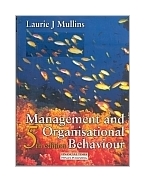Management and Organisational
Behaviour
Building on the strengths of
the four previous editions, Management and Organisational Behaviour, 5ed has been
significantly updated, while retaining its distinctive managerial approach. The
interactions among the structure and operations of organisations, the process of
management and the behaviour of people at work are the main concerns of the book, while
the need for organisational effectiveness and the importance of the role of management as
an integrating activity are underlying themes throughout.
New to this edition are chapters on organisational learning and on technology. Throughout
there is now greater emphasis on international issues, the impact of IT, ethics and social
responsibility. Cases and examples have been selected from a variety of organisations -
public, private, voluntary and international.
Subjects such as power and politics, innovation, learning organisations and empowerment
have been given greater prominence.
All this is generously supported by short and long cases from the Financial Times and
other sources,manager profiles, boxed exhibits and newspaper articles to provide a
real-life context. Pedagogical features such as learning objectives, assignments, review
and discussion questions enhance the learning
experience.
Relates the study of
organisational behaviour to that of management.
Illustrates the applications of behavioural science within work organisations and the
implications for management action.
Text supported by a wealth of Financial Times and other case material from private,
public, voluntary and international organisations.
Full range of supplements available for the lecturer.
Four-colour text.
PART ONE - Management and
Organisational Behaviour
1.Introduction
2.Nature of Organisational Behaviour
3.Approaches to Organisations and Management
PART TWO - Context of the Organisation
4.The Nature of Organisations
5.Organisational Goals and Objectives
PART THREE - Role of the Manager
6.The Nature of Management
7.Managerial Behaviour and Effectiveness
8.Leadership
PART FOUR: The Individual
9.Individual Differences
10.Learning
11.Perception
12.Motivation
PART FIVE - Groups
13.Nature of Groups
14.Group Processes and Behaviour
PART SIX - Organisation Structures
15.Meaning and nature of organisational structure
16.Variables influencing organisation structure
17.Technology
PART SEVEN - Management of Human Resources
18.Job Satisfaction and Performance
19.The Personnel/HR Function
20.HR in Action
PART EIGHT - Improving Organisational Performance
21.Organisational Control
22.Organisational Development
23.Management development and Organisational Effectivenes
Laurie Mullins
Formerly principal lecturer at The Business School, University of Portsmouth.
Contributions from Linda Hicks and David Preece, both of the Business School, University
of Portsmouth.
670 pages
Księgarnia nie działa. Nie odpowiadamy na pytania i nie realizujemy zamówien. Do odwolania !.


